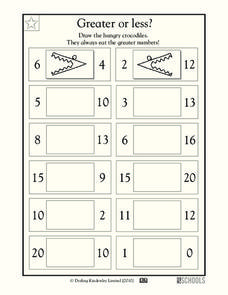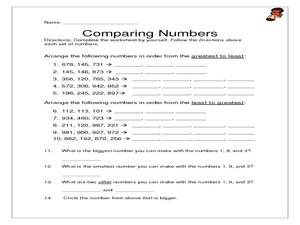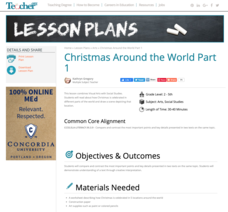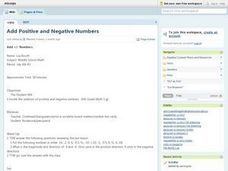Curated OER
Comparing Whole Numbers to 5
In this comparing whole numbers worksheet, students insert the greater than less than or equal to sign to compare pairs of numbers to 5. An answer key is included and examples are completed for students.
One Billion
Math, Age 3-5
Jump start children's math education with this fun basic skills resource. Offering dozens of different touch-and-swipe activities with colorful graphics, this program is perfect for all young learners.
Curated OER
One-Digit Divisors
Young mathematicians problem solve 12 division math problems involving one-digit divisors and remainders. They put their answers on the lines provided.
Curated OER
Greater or Less?
These crocodiles are hungry for the biggest numbers they can find! This is a fun way to illustrate number comparison; use crocodile mouths as the greater than and less than symbols. There are two examples (with teeth and eyes included)...
Rational Number Project
Initial Fraction Ideas Lesson 18: Overview
Develop young mathematicians' ability to compare fractions with investigation into the number 1/2. After brainstorming a list of fractions equivalent to 1/2, children identify a pattern in the numerators and denominators that allows them...
EngageNY
Distance and Complex Numbers 2
Classmates apply midpoint concepts by leapfrogging around the complex plane. The 12th lesson in a 32 segment unit, asks pupils to apply distances and midpoints in relationship to two complex numbers. The class develops a formula to find...
Coloring Squared
Baseball Player Comparing Unlike Fractions
Hit unlike fractions out of the park in a comparing fractions color by number (symbol) worksheet. Young mathematicians place <, >, or = to make each comparing sentence true. Then, they use a key to color accordingly. When complete,...
Curated OER
Rounding Whole Numbers
Can your fourth graders round to the nearest 10? What about the nearest 100, or 10,000? A thorough resource helps them practice rounding numbers of varying size. Four sets of problems prompt learners to round to specified place values,...
Curated OER
How Many?
Establish 1:1 correspondence by counting students, first one gender, then the other. Give each child a colored cube (one color for boys, another for girls) and have small groups determine more or less and how many all together. As a...
CK-12 Foundation
Properties of Rational Numbers: Lollipop Trees
A six-question interactive takes mathematicians to Lollipop Land where they manipulate lollipop trees to make equivalent ratios. Question types include multiple-choice, true or false, and a discussion.
Curated OER
Arranging Numbers in order up to 1,000
Third graders arrange numbers up to 1,000. For this arranging numbers lesson, 3rd graders play a game to try and build the biggest number they can using number tiles. Students work in groups to draw number tiles from a jar and arrange...
Curated OER
Compare Numbers to 200
In this number comparison worksheet, 2nd graders compare two and three digit numbers to 200 in 6 word problems. They compare up to four numbers in each problem.
Curated OER
Study Guide: Rational Numbers
In this rational numbers worksheet, students solve and complete 8 different problems that include applying the comparison property and density property for rational numbers. First, they replace each blank with the correct symbol to make...
Curated OER
Compare and Order Whole Numbers
In this compare and order whole numbers worksheet, students sharpen their problem solving skills as they solve 6 story problems.
Curated OER
Valentine's Day Ordering and Comparing (D)
For this math worksheet, students solve 24 problems pertaining to Valentine cards received and given by a child over a 5 year period. Students examine the information charts and answer questions about the data.
EngageNY
Complex Numbers and Transformations
Your learners combine their knowledge of real and imaginary numbers and matrices in an activity containing thirty lessons, two assessments (mid-module and end module), and their corresponding rubrics. Centered on complex numbers and...
Curated OER
Double Your Money
What a creative way to delve into adding large numbers! After listening to a story called The King's Chessboard, learners estimate how much money they would have each day following instructions based on doubling and exponentially...
Teacher.org
Christmas Around the World Part 1
A creative lesson shines a spotlight on Christmas celebrations throughout six different countries. Scholars read an informative text and share their new-found knowledge with their peers. After hearing about each country, pupils choose...
Curated OER
Comparing Numbers Up to 10 Step-by-Step Lesson
A teacher resource, this scripted lesson details how to explain to learners the steps involved in determining which numbers in a series are bigger or smaller than a given number. The referenced pupil worksheet is not included.
Norm Mitchell
Quiz: Representing, Comparing, and Ordering Decimals
Here is a 42-question quiz dealing with decimals to the thousandths place. It is comprehensive in that it has test takers use inequality signs to compare pairs of decimal numbers, choose the least- or greatest-valued nubmer out of a set...
Curated OER
Compare and Order Fractions
In this compare and ordering fractions worksheet, learners compare fractions and order them from least to greatest. Students compare 6 fractions and order 20 sets of fractions, and answer 4 word problems.
Curated OER
Use Models to Compare and Order Integers
Students investigate the concept of integers and how they should occur in the realm of irrational numbers. The lesson includes the use of positive and negative integers. The lesson is a good foundation in order to move into calculating...
Curated OER
Comparing Fractions and Equivalence
Which fraction is greater than? Less than? There are 10 problems here that give scholars a visual approach to comparing fractions. They start by writing the fractions represented in a shaded shape. Then, they begin comparing visual...
Curated OER
Add Positive And Negative Numbers
Scholars investigate the concept of adding positive and negative numbers. They practice adding using the number line for scaffolding. This can be done as a game for younger learners, but may also be helpful for engaging the older pupils.

























